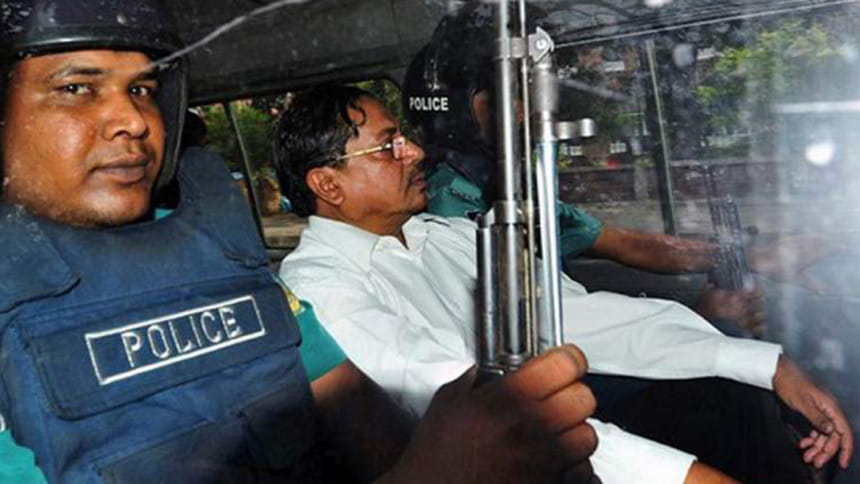Key man of Al-Badr

This story was first published on May 10, 2013 at http://thedailystar.net
Son of Insan Ali Sarkar of Kumri Mudipara in Sherpur, Kamaruzzaman was born on July 4, 1952. He got involved in Islami Chhatra Sangha when he was a student of class-X.
He passed the Secondary School Certificate examination from GKM Institute in Sherpur in 1967.
Soon he became the general secretary of Chhatra Sangha of a dormitory unit at Jamalpur Ashek Mahmud College and then the president of Chhatra Sangha of greater Mymensingh district (Mymensingh, Jamalpur and Sherpur) in 1971.
According to prosecution documents, Al-Badr, an auxiliary force of the occupation Pakistani army, was formed after the army entered Jamalpur on April 22, 1971. The entire Mymensingh district Chhatra Sangha joined the Al-Badr force within a month under Kamaruzzaman.
Identity of Kamaruzzaman as the chief organiser of the Al-Badr has been very much evident from a report published in Jamaat's mouthpiece daily Sangram on August 16, 1971.
The report said Momenshahi [Mymensingh] Al-Badr organised a rally and symposium at local Muslim Institute on August 15 marking the 25th independence day of Pakistan and Kamaruzzaman, as the chief organiser of Al-Badr, chaired the programme.
After taking short training, Al-Badr men started committing atrocities targeting the Hindus and unarmed Bangalees of greater Mymensingh, say the prosecution documents, adding that Kamaruzzaman also served as the office secretary of East Pakistani Islami Chhatra Sangha during the war.
After the Liberation War, law enforcers arrested Kamaruzzaman in the capital on December 29, 1971 as one of the collaborators of the Pakistani army.
Bangla daily Purbadesh ran a report headlined "15 more collaborators including Deen Mohammad arrested" on December 31, 1971. The Dainik Bangla published another report headlined "15 more collaborators arrested" on the same issue on the same day.
Kamaruzzaman was 14th on the list of arrestees published in the reports. He was 287th on a list of arrested collaborators of Dhaka that was prepared by the Directorate of National Security Intelligence (NSI) Bangladesh on April 13, 1972.
News of his arrest was substantiated from the testimony of Kafil Uddin, elder brother of Kamaruzzaman as well as the fourth defence witness in the case.
During his cross-examination, Kafil said Kamaruzzaman was detained at Kamalapur Railway Station when he had gone to Dhaka at the end of 1971 but was released after 90-105 days.
Sources in the investigation agency say Kamaruzzaman sat for the HSC examinations from Dhaka Central Jail in 1972 and got released after around nine months as no case was filed against him in Dhaka. But a case was filed against him in Mymensingh under the Collaborator Act, 1972.
According to a report on the findings of the People's Inquiry Commission published in March, 1994, Hasanuzzaman, brother of victim Badiuzzaman, filed a case with Nalitabari police after independence against Kamaruzzaman as the principal accused and 17 others in connection with his brother's killing.
Hasanuzzaman as a prosecution witness in the war crimes case against Kamaruzzaman also mentioned that case.
After the rebirth of Jamaat's student wing Islami Chhatra Sangha as Islami Chhatra Shibir on February 6, 1977, Kamaruzzaman became its president in the second executive committee. War crimes suspect Mir Quashem Ali was the president of the first committee, according to prosecution documents.
Kamaruzzaman joined Jamaat in 1979.
According to the defence documents, he obtained bachelor's degree in 1974 and master's in journalism from Dhaka University in 1976.
He joined monthly Dhaka Digest as an executive editor in 1980. Thereafter he took charge of weekly Sonar Bangla as its editor in 1981 and still remains in that position. He joined the daily Sangram as an executive editor in November 1983 and served in the post until 1993.
In October 1979, he joined Jamaat's Dhaka city unit and served as a joint secretary in 1981-82, say the defence documents, adding that he was the central publicity secretary from 1983 to 1991. He has been serving as an assistant secretary general of Jamaat since 1992.
Kamaruzzaman, father of five sons and one daughter, contested the parliamentary elections in 1986, 1991, 1996, 2001 and 2008 but could never win.
Detained on July 13, 2010 in a criminal case, Kamaruzzaman was shown arrested in the war crimes case on August 2 the same year.
After a long proceeding, he was convicted and given death penalty yesterday.

 For all latest news, follow The Daily Star's Google News channel.
For all latest news, follow The Daily Star's Google News channel. 



Comments